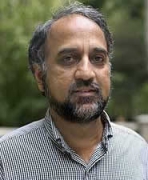Awards
- Bicentennial Medal - 2020
- National Academies - 2019
- American Association for the Advancement of Science
- Distinguished Professor - 2014
- International Academies - 2008
- Royal Society of Chemistry

Krishnan Raghavachari earned his B.Sc. in 1973 from Madras University, his M.Sc. in 1975 from the Indian Institute of Technology, and his Ph.D. in Chemistry from Carnegie Mellon University. From 1981-1986 he was a member of the technical staff and from 1987-2002 a distinguished member of the technical staff at Bell Laboratories. He joined the Department of Chemistry at Indiana University Bloomington as Professor in 2002.
Raghavachari is recognized as "one of a top handful of quantum chemists in America" whose main contributions have been as a pioneer in the development and application of quantum chemical calculations. His work covers a broad spectrum of problems ranging from chemical bonding in small clusters to computational investigations of semiconductor and nanoscale materials. His methods and algorithms have been instrumental for the widespread use of computational chemistry by nonexperts. Raghavachari's analysis of the nature of three electron correlation effects (triple excitations) led to the development of a new method in 1989, termed CCSD(T), that provides a perturbative and accurate treatment of their effects in coupled cluster theory. More than two decades later, the CCSD(T) method still stands as the method of choice for accurate evaluation of bond energies and properties of molecules. Its combination of accuracy and applicability makes it a uniquely suitable method for a wide variety of molecules, and it has been termed as the "gold standard of quantum chemistry." Raghavachari's second major contribution to quantum chemical methods has been the collaborative development (with Larry Curtiss of Argonne, and John Pople) of the so-called Gaussian-2, 3, 4 (G2, G3, G4) methods, which are hybrid quantum chemical theories that aim to yield relative reaction energies to a precision of approximately 1 kcal/mol. In addition to numerous applications performed themselves, the Gaussian-n methods have been very widely adopted by non-specialist users. Raghavachari has made "sustained outstanding achievements in the development of theoretical methods and seminal contributions to surface chemistry."
Among Raghavachari's over 150 invited lectures in more than a dozen countries include the Australian Association of Theoretical and Computational Chemists Lecturer, Plenary Speaker at the QAFCO-TAMUQ Chemistry Conference in Qatar, Musulin Lecture, Kilpatrick Lecture, and Coulson Lecture. He has been elected to the International Academy of Quantum Molecular Science, and is a Fellow of the Royal Society of Chemistry and the American Physical Society, Chemical Physics Division. In 2009, he received the Davisson-Germer Prize in Surface Physics from the American Physical Society.
Professor Raghavachari has published over 320 scientific papers in chemistry, physics, and materials science and his more than 50,000 citations have yielded an Institute for Scientific Information Highly Cited Researcher notation. He has served as chair of the Theoretical Chemistry Subdivision of the American Chemical Society, and on the editorial boards of the Journal of Physical Chemistry, Journal of Computational Chemistry, Theoretical Chemistry Accounts, and the Journal of Materials Research.
Raghavachari received the IU Bicentennial Medal in September 2020 in recognition of his distinguished contributions to Indiana University.